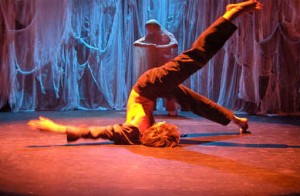
Carlynn Reed and Jonathon Neville answer some questions about Imagiscape’s Let’s Play House, a compelling expression of the complexities of caregiving. Six years after its premiere, it comes to the Toronto Fringe Festival. Carlynn and Jonathon (J&C) answer some questions.
LR: Can you tell me what Let’s Play House is about?
J&C: Let’s Play House is about changing habits – it’s about changing families without making everyone hate everyone. It is about us as caregivers. Jonathon is sole caregiver for his mom, Christine, who has Alzheimer’s. Following university, living at home was becoming stressful but it was increasingly clear she could not live alone. She clutches to a PhD which can’t help her now. She says she wishes she was dead.
Carlynn is primary caregiver for her son, Kirk, who suffered a soccer injury. Instead of healing normally, he plummeted into full-body pain. This once-tough athlete and great musician lay on the couch, unable to walk or talk. Months turned to years. No diagnosis. Grim prognosis.
We create theatre with our families, about our families. The story overlays and interweaves 3 stories: each of our homes, and the creative process that changed them. Dance is integral to the story.
LR: How have you managed to create a show about chaotic caregiving while experiencing chaotic caregiving?
J&C: When we discovered we were both caregivers and dancers and theatre artists, we knew we needed to take our homes through a creative process. Our homes were stuck systems, where attempts to help elicited defence mechanism responses. Creating this theatre project gave us something we could do together – something we could talk about that was actually enjoyable. It created a context that allowed open dialogue.
We transcribed and categorized fights. We went into rehearsal having a sense of the dynamics that lead to our various typical conflicts. We challenged each other when we saw repetitive default behaviours. We began to care for the progress in the other home as much as our own.
We filmed rehearsals at home for purposes of a future documentary. Although initially we did not realize how supportive this would be, the camera was attentive, kind, steady, compassionate, and patient. Our videographer was our ‘outside eye’ – an integral part of our process.
LR: Has the autobiographical nature of the performance been difficult or challenging?
J&C: We needed consensus without compromising the drama. For instance, Jonathon had to get Christine to agree that the not-always-pretty presentation of her is fair – and that it should be exposed to the public to see. She accepted the suggestion that it does not make her look bad – rather she looks grand to have been willing to give her story to help other struggling families.
Christine and Kirk both contributed to the script. When we started learning lines, Christine was our script prompter. She wouldn’t let us include a fart scene. We honoured her request.
Kirk wrote two songs for the show – he was unable to hold his guitar or play piano or sing, but he whistled and Jonathon played it back on the piano. That was Kirk’s first creative act in several years. This time round he is half of the Stage Managing team and excerpts from his new band’s first CD complement the original score.
We had previously collaborated on choreography, but this was the first time either of us had collaborated on a script. Many times the process of writing was as painful as the caregiving itself, and there were moments when we were on the edge of abandoning the project. The script is still evolving as we integrate elements previously left on the “cutting room floor”.
LR: Can you speak a bit about the other ways and places Let’s Play House has been presented and performed?
J&C: We have performed LPH at the Fringe (Edmonton), at a rented venue (Toronto’s Wellesley Street Theatre), at churches and as the keynote presentation at conferences and AGMs for the Ontario Federation of Cerebral Palsy, the Festival of International Conferences on Caregiving, Disability, Aging and Technology, and others.
LR: Why did you choose to participate in the Toronto Fringe with this work?
J&C: The Fringe exposes our work to audiences beyond our fan base or outreach channels. Our caregiving was restricting our freedom to travel or even organize a theatrical run in Toronto. Kirk moved out on his own last year. Christine moved into a nursing home in March. Now we take the world – starting in, and always returning to, Toronto.
Presented by Imagiscape
Director: Dennis Hassell
Choreographer: Carlynn Reed & Jonathon Neville
Cast: Carlynn Reed & Jonathon Neville
Genre: Drama, Dance
Venue 6 George Ignatieff Theatre
60 min.
Fri, July 8 8:45 PM
Sat, July 9 1:45 PM
Sun, July 10 3:00 PM
Mon, July 11 10:15 PM
Wed, July 13 5:45 PM
Sat, July 16 12:30 PM
Sun, July 17 7:30 PM
All individual Fringe tickets are $10 at the door (cash only). Tickets are available online at www.fringetoronto.com, by phone at 416-966-1062, in person at The Randolph Centre for the Arts, 736 Bathurst Street (Advance tickets are $11 – $10+$1 convenience fee).
Several money-saving passes <link to: http://fringetoronto.com/fringefest/passes.html> are available if you plan to see at least 5 shows

Great interview. I saw this show yesterday and this answered some lingering questions I had. Thanks for this!